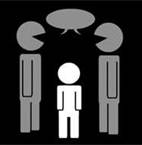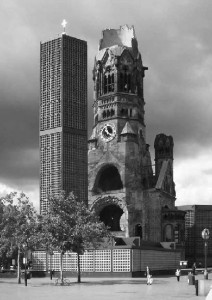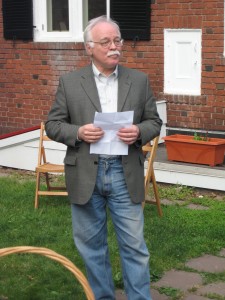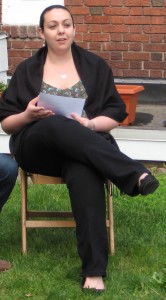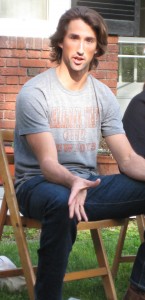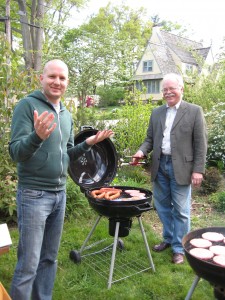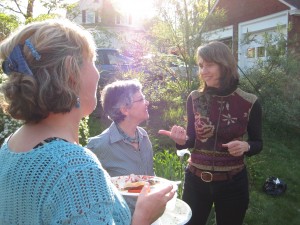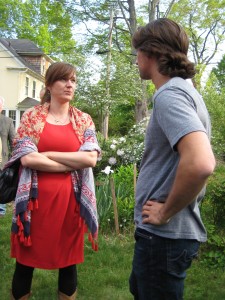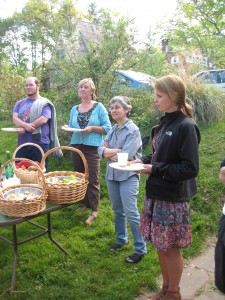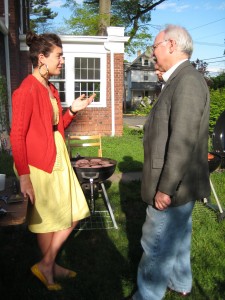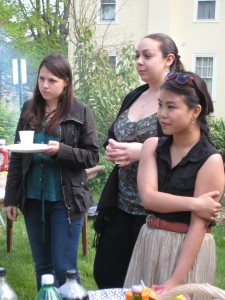
Matthew Alexander ’12, a Phi Beta Kappa scholar and the recipient of the Blankenagel Prize for his outstanding accomplishments in German, also received a Fulbright assistantship to teach English at a high school in Saxony, Germany. Matt’s thesis, for which he received high honors, was a translation and adaptation of Lord Schadt’s online play, “Lost Modern  Love.” The play premiered at Wesleyan in May 2012 under Matt’s direction. An excerpt of his adaptation has been published in VOID Digest Vol. 2, May 2012, pp. 57-59. This summer Matt will intern as a script reader in Los Angeles.
Love.” The play premiered at Wesleyan in May 2012 under Matt’s direction. An excerpt of his adaptation has been published in VOID Digest Vol. 2, May 2012, pp. 57-59. This summer Matt will intern as a script reader in Los Angeles.
Max Flescher ’12 is an alternate for a Fulbright teaching assistantship to teach ESL in Austria.
 Lynn Heere ’12 received a Fulbright assistantship to teach English at a high school in Thuringia, Germany. She also received a teaching assistantship for English in Kärnten, Austria, but decided in favor of Germany. Lynn
Lynn Heere ’12 received a Fulbright assistantship to teach English at a high school in Thuringia, Germany. She also received a teaching assistantship for English in Kärnten, Austria, but decided in favor of Germany. Lynn  wrote her thesis, for which she received honors, on “From Spassguerilla to Stadtguerilla: The Theory and Praxis of the West German Student Movement.”
wrote her thesis, for which she received honors, on “From Spassguerilla to Stadtguerilla: The Theory and Praxis of the West German Student Movement.”
Steven Le ’12 will be teaching English as a Foreign Language in Vietnam. He leaves to take up his teaching position in July.
 Jessica Spates ’12 received the Baden-Württemberg scholarship for study and research at Freiburg University in Germany.
Jessica Spates ’12 received the Baden-Württemberg scholarship for study and research at Freiburg University in Germany.
 Katherine Wolf ’12 was awarded the Scott Prize for excellence in foreign-language study. A major in German Studies and art history, she wrote her senior essay on “The Fabric of the Bel Composto: Bernini’s Draperies and the Redefinition of the Arts.”
Katherine Wolf ’12 was awarded the Scott Prize for excellence in foreign-language study. A major in German Studies and art history, she wrote her senior essay on “The Fabric of the Bel Composto: Bernini’s Draperies and the Redefinition of the Arts.”
 Carmen Yip ’12, a Phi Beta Kappa scholar and double major in German Studies and sociology, will be working as a resource analyst for Deutsche Bank in New York. She will start her training in September 2012, then move to London, followed by Frankfurt, before returning to New York City. Carmen plans to spend the summer at home in Hong Kong.
Carmen Yip ’12, a Phi Beta Kappa scholar and double major in German Studies and sociology, will be working as a resource analyst for Deutsche Bank in New York. She will start her training in September 2012, then move to London, followed by Frankfurt, before returning to New York City. Carmen plans to spend the summer at home in Hong Kong.
Wesleyan University Program in Regensburg Participants
Hsiao Tung Huang ’12, a dance major, declined an offer to study in the European Erasmus Program in favor of the dance program at NYU’s Tisch School of the Arts. But she hopes to return to Germany very soon!
Lana ’12, a music major, received the Baden-Württemberg scholarship and will conduct research at Heidelberg University in Germany next year. She hopes to find a performing arts internship in Heidelberg.
And what are some of our sophomores and juniors doing this summer? 
Julius Bjornson ’14 has been studying in Regensburg since January 2012 and will finish his semester at the end of July. Then he will move to France, where he will spend a semester in Wesleyan’s Paris program.
Nathaniel Elmer ’14 received a DAAD (German Academic Exchange Service) University Summer Course Scholarship for the Humboldt University summer course “Deutsch Erleben.”
James Gardner ’13, a Mellon Mays Fellow, has been studying under the auspices of the Berlin Consortium for German Studies at Berlin’s Free University since February 2012, while conducting independent research on Afro-Germans.
Mari Jarris ’14 received a scholarship from the DAAD to attend a German language and culture course from July 8 to August 2 at Bremen University in Germany.
Julian Theseira ’14 received a DAAD scholarship to attend a summer course on German literature at the Catholic university Eichstätt-Ingolstadt from July 17 to August 9, 2012. The course focuses on the discovery of physical spaces in modern German literature.
Oscar Takabvirwa ’14 has been studying at Regensburg University since January 2012; the semester there ends in late July.
 Avery Trufelman ’13 received the Prentice Prize, given to a junior or senior who excels in German or French. Avery also received the DAAD “internxchange” scholarship, which will enable her to spend 11 weeks in Berlin this summer. She will attend a 6-week seminar program designed to deepen the recipient’s understanding of the politics, society, and culture of Germany, the country’s current media landscape, and working conditions for journalists. She will complete her stay with a 5-week internship with a German newspaper, (online) magazine, TV or radio station, or press or PR agency in or near Berlin.
Avery Trufelman ’13 received the Prentice Prize, given to a junior or senior who excels in German or French. Avery also received the DAAD “internxchange” scholarship, which will enable her to spend 11 weeks in Berlin this summer. She will attend a 6-week seminar program designed to deepen the recipient’s understanding of the politics, society, and culture of Germany, the country’s current media landscape, and working conditions for journalists. She will complete her stay with a 5-week internship with a German newspaper, (online) magazine, TV or radio station, or press or PR agency in or near Berlin.
 On October 14, actors from the Berliner Ensemble, the theater founded by Bertolt Brecht, will stage a second dramatic reading of Leo Lensing’s edition of Schnitzler’s Träume, co-edited with Peter Michael Braunwarth and published by Wallstein Verlag. The first performance was given on June 24 to a full house.
On October 14, actors from the Berliner Ensemble, the theater founded by Bertolt Brecht, will stage a second dramatic reading of Leo Lensing’s edition of Schnitzler’s Träume, co-edited with Peter Michael Braunwarth and published by Wallstein Verlag. The first performance was given on June 24 to a full house.




